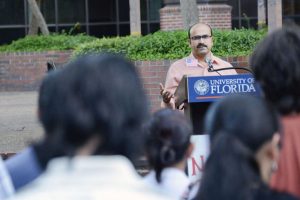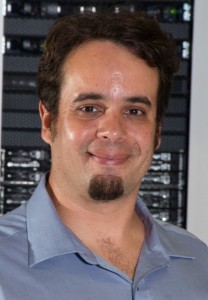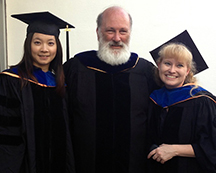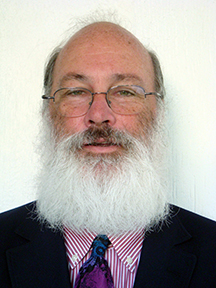Nepali PhD candidate cited for promoting global engagement

Uttam Gaulee speaks at Turlington Plaza during a vigil to commemorate the earthquake victims in Nepal.
Nepal native Uttam Gaulee has scaled some impressive peaks as he has pursued a doctorate in higher education administration at the UF College of Education.
Earlier this year, he was one of 10 scholars nationwide chosen by the Association of American Colleges and Universities (AACU) to receive the 2016 K. Patricia Cross Future Leaders Award, which recognizes leadership ability in teaching and learning.
The AACU was impressed with Gaulee’s academic work and contributions to the university and the community. He represents “the finest in the new generation of faculty who will be leading higher education in the next decades,” AACU President Carol Geary Schneider wrote in a letter announcing Gaulee’s award.
In May, Gaulee defended his dissertation for a doctorate in Higher Education Administration with a research paper titled “American Students’ Experiences with their International Peers on Campus: Understanding Roadblocks, Enhancing Pathways of Global Engagement.”
He used surveys, interviews and focus groups to uncover roadblocks to improving global engagement among U.S. students. Despite the professed importance of “global competency” in an increasingly interconnected world, he found that most domestic students largely missed opportunities to create rich meaningful relationships with foreign students.
Gaulee’s interest in international learning stems from his personal journey, which began on the other side of the globe, in a valley not far from the world’s tallest mountains.
He grew up as the eldest boy of eight children in a poor family in the small city of Surkhet. His parents were subsistence farmers. No relatives had ever attended college. But Gaulee showed academic promise, became a star student and pursued a college degree while working as a high school English teacher.
In an interview, Gaulee laughed about how naïve he was and how limited his worldview had been.
“In Nepali, my name means the best,” Gaulee said. “And I grew up thinking my family is the best, my country is the best, my language is the best, and so on. It wasn’t until I was able to cross those hills and was exposed to other parts of the world that I learned from people from many different countries.”
In time, he traveled to Nepal’s capital, Kathmandu, where he earned a master’s in education from Tribhuvan University and then to England for an international academic conference. This led him to apply for and receive a Fulbright Scholarship to earn another master’s degree, in education administration and policy studies, at the University of Pittsburgh.
In 2012, Gaulee came to UF, where he has worked closely with Dale Campbell, professor and coordinator of higher education administration, who chaired of his dissertation committee, and with David Miller, his committee co-chair and director of the School of Human Development and Organizational Studies in Education.
Gaulee’s interest in improving global relationships has stretched across UF’s campus. He served as a graduate student senator to the Student Government and spearheaded the effort to rename the campus’ North Lawn the “Global Garden” to serve as a social space where U.S. and international students can gather and learn about each other’s cultures. The space also would display artifacts from around the world, highlighting UF’s commitment to creating a globalized community of scholars and students. The Student Government passed a resolution calling on the university to create the garden.
Miller said he first met Gaulee when he directed a task force that formulated the Learning without Borders: Internationalizing the Gator Nation initiative, a plan designed to improve student engagement in international learning experiences.
“Uttam has shown remarkable passion and leadership in creating opportunities for students to heighten their international awareness,” Miller said. “I expect he will continue to be a driving force in internationalizing student experiences at whatever institute of higher education he ends up in.”
Gaulee is on track to receive his doctorate in August and then he and his wife plan to return to Nepal. He is considering an opportunity to serve as a leader at a new university in his hometown in hopes of improving Nepalese and international higher education at large.
“I’m grateful for all the opportunities I have had to keep learning,” Gaulee said. “I want to help others to do the same, and inspire them to learn about different cultures and societies.”
Source: Uttam Gaulee, 412-805-4745
Writer: Charles Boisseau, news and communications, UF College of Education; 352-273-4449







